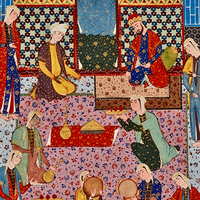Jaʽfar ibn Yahya جعفر بن يحيى | |
|---|---|
 Detail of a miniature illustrating an anecdote in which the power and influence of Jaʻfar ibn Yahya (crowned figure) is pointed out. Folio from a manuscript of Nigaristan, Iran, probably Shiraz, dated 1573-74 | |
| Born | c. 767 Khorasan, Abbasid Caliphate |
| Died | c. 803 Abbasid Caliphate |
| Cause of death | Execution on the orders of Caliph Harun al-Rashid |
| Other names | Aba-Fadl |
| Occupation | Abbasid vizier |
| Years active | c. 798 – 803 |
| Era | Abbasid |
| Parents |
|
Jaʽfar ibn Yahya Barmaki or Jafar al-Barmaki (Persian: جعفر بن یحیی برمکی, Arabic: جعفر بن يحيى, Jaʽfar bin yaḥyā) (767–803), also called Aba-Fadl, was a Persian vizier of the Abbasid caliph Harun al-Rashid, succeeding his father (Yahya ibn Khalid) in that position. He was a member of the influential Barmakid family, formerly Buddhist leaders of the Nava Vihara monastery. He was executed in 803 at the orders of Harun al-Rashid.
He had a reputation as a patron of the sciences, and did much to introduce Indian science into Baghdad.[1] He was credited with convincing the caliph to open a paper mill in Baghdad, the secret of papermaking having been obtained from Tang Chinese prisoners at the Battle of Talas (in present-day Kyrgyzstan) in 751.[citation needed]
- ^ van Bladel, Kevin (2011). "The Bactrian Background of the Barmakids". In A. Akasoy, C. Burnett and R. Yoeli-Tlalim (ed.). Islam and Tibet: Interactions along the Musk Routes. London: Ashgate. pp. 43–88.